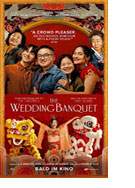

Opening 5 Jun 2025
Directed by:
Andrew Ahn
Writing credits:
Andrew Ahn, James Schamus, Ang Lee, Neil Peng
Principal actors:
Bowen Yang, Lily Gladstone, Kelly Marie Tran, Han Gi-Chan, Joan Chen
It’s asking for trouble, seeing a remake of a movie that one loved in the original; it’s almost as bad as seeing a movie based on a favorite book. Ang Lee’s lovely film of 1993 was not only an instant classic of queer cinema but an incisive study of Confucian family dynamics in flux. It featured a gay man being forced to marry a woman for a visa (hers) and family expectations (his). These elements are retained in this recent remake, sort of. The featured family is now Korean instead of Taiwanese, but the same principles apply.
Perhaps comparisons aren’t fair, but, as stated, I loved the original, so it’s unavoidable. The action in 1993 revolved around the massive, showy wedding banquet itself, featuring the food porn that Ang Lee is known for (see Eat Drink Man Woman [1994]), and, I gotta say, I missed that in the remake. Also, the Confucian element in the remake is only stated for what’s obvious about it—everyone knows the expectations that traditional Asian elders put on their children, so here it is taken as a given, embodied in a homophobic grandfather whose demands create the conflict (but who never actually makes an appearance on screen). Traditional granny (Youn Yuh-Jung) does, although she comes around to modern ways of thinking quickly and easily. Which was surprising. But this is a romantic comedy, and the ugliness of hate is depicted only as something very far away and embodied in one ancient man who is dying anyway. So that’s nice.
In fact, one mother (Joan Chen) has come around so hard to modern ways so hard that she’s become a celebrated LGBTQ+ ally, much to her daughter’s fury. Said daughter is Angela (Kelly Marie Tran), who is busy trying to make an IVF baby with her partner, Lee (Lily Gladstone). They live in an inherited house in Seattle and rent their guest cottage to a male couple, Chris (Bowen Yang of SNL fame) and Min (Han Gi-Chen). Min is a textile artist, but he is also the heir to a large family business back in Korea, which he is now expected to return home to and run—or be cut off forever. He’d also lose his US visa.
The sham heterosexual marriage to obtain a visa which was the crux of the original movie is forced to deal with a new twist—the fact that gay marriage exists now. Therefore, in this updated version, the problem is Chris, who is simply allergic to commitment. Hence Min proposes to Angela, promising continued funding for Lee’s IVF in exchange for a visa. Things get wacky when Korean granny flies over for the wedding.
This may be the primary difference between the remake and the original. This new film is less about culture and more about individuals. The demons here are personal, not social, so much. And, notably, the demons these people have are not related to sexual orientation. Angela’s unresolved mommy issues, Lee’s difficulty conceiving, Chris’s inability to finish anything—these people have a pack of problems but being queer isn’t one of them. So maybe the characters were a little one-dimensional (although Angela spends an awful lot of time sobbing for someone who supposedly bottles up her feelings). And I was sorry that the wedding banquet itself was a small, sparsely-attended affair. But the romantic payoff at the end (more than one!) is over-the-top in the best tradition of classic rom-coms, all big feelings and heartfelt declarations and promises of a rich and storied future. So maybe, in that sense, The Wedding Banquet is traditional after all. (Mason Jane Milam)